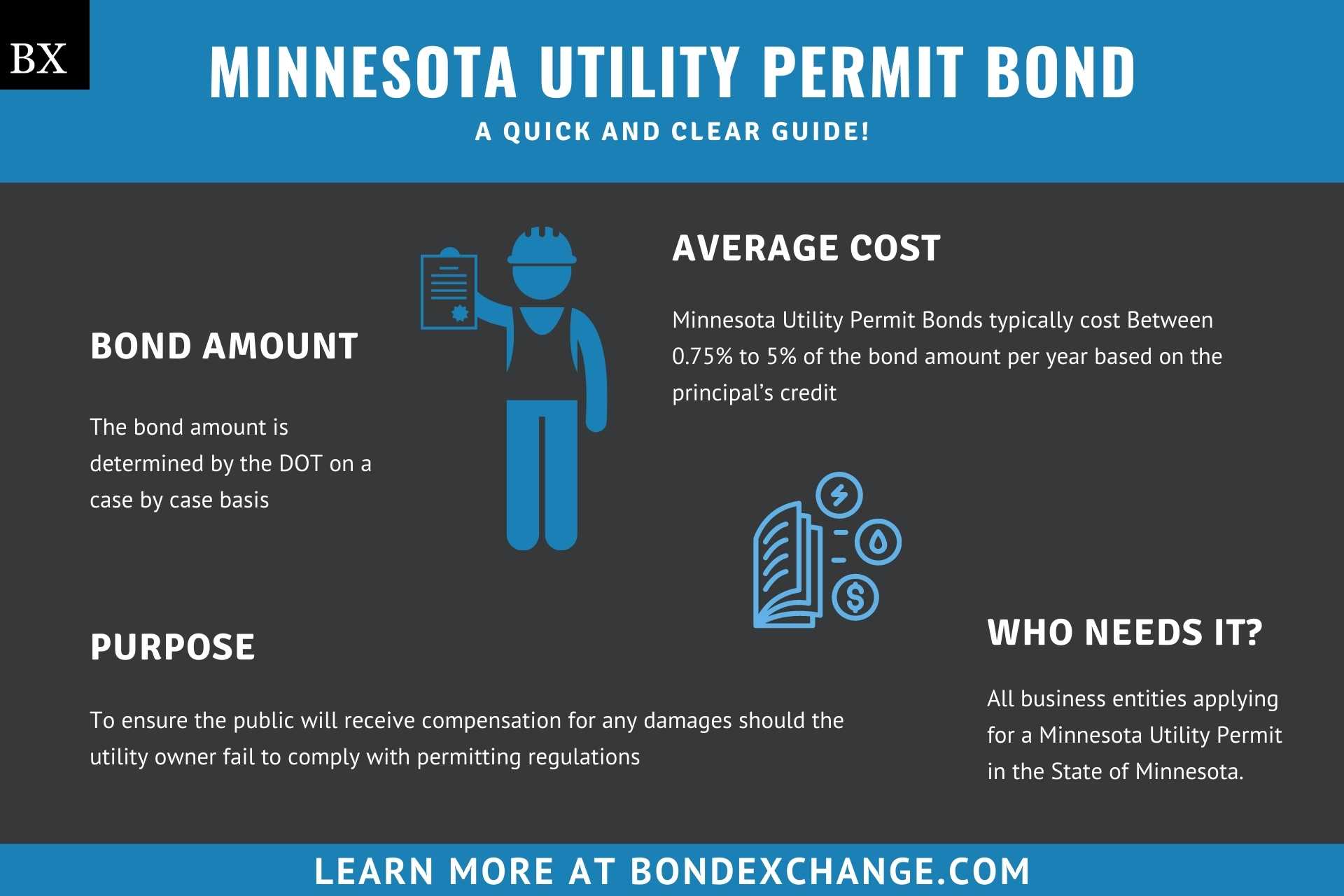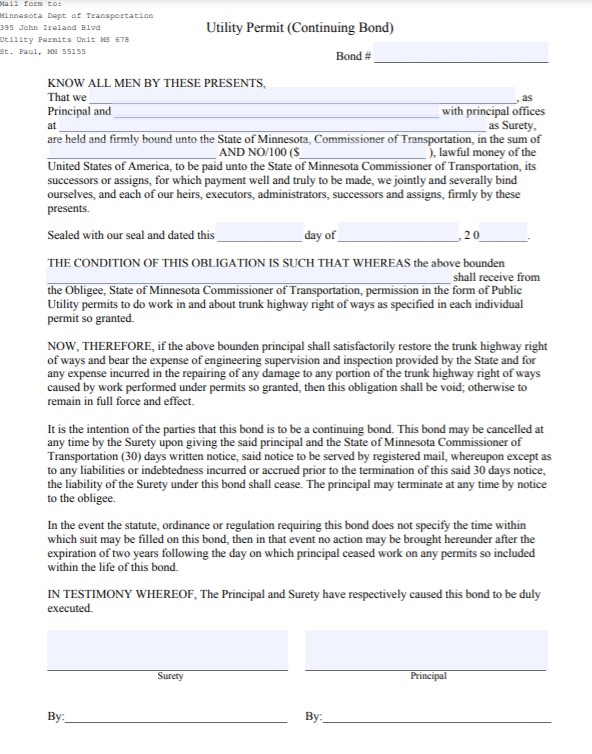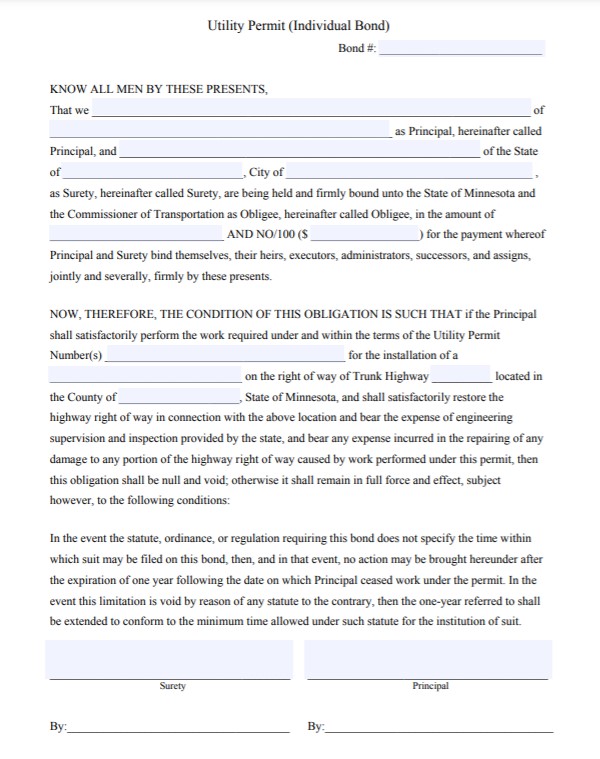Minnesota Utility Permit Bond: A Comprehensive Guide
February 17, 2021

This guide provides information for insurance agents to help Utility Owners on Minnesota Utility Permit Bonds
At a Glance:
- Average Cost: Between 0.75% to 5% of the bond amount per year based on the principal’s credit
- Bond Amount: Determined by the DOT on a case by case basis
- Who Needs It: All utility owners seeking to obtain a permit in the State of Minnesota
- Purpose: To ensure the public will receive compensation for any damages should the utility owner fail to comply with permitting regulations
- Who Regulates Water Utility Permits in Minnesota: The Minnesota Department of Transportation (DOT)
Background
Minnesota Statute 84.415 requires utility owners to obtain a permit prior to placing a new facility within trunk highway right of way or altering existing facilities. The Minnesota legislature enacted permitting laws and regulations to ensure that utility owners engage in ethical business practices. In order to provide financial security for the enforcement of the permitting law, utility contractors in Minnesota must either deposit cash or purchase and maintain a Utility Permit Surety Bond. The DOT allows utility owners to purchase either a continuing bond that covers all permit applications, or an individual bond which covers one specific permit application. Utility owners who elect to purchase an individual bond will need to obtain a separate bond for each permit application.
What is the Purpose of the Minnesota Utility Permit Bond?
Minnesota requires utility owners to purchase the Utility Permit Bond as part of the application process to obtain a permit with the DOT. The bond ensures that the public will receive compensation for financial harm if the utility owner fails to comply with the terms of the permit. In short, the bond is a type of insurance that protects the public if the utility owner breaks permitting laws.
How Can an Insurance Agent Obtain a Minnesota Utility Permit Surety Bond?
BondExchange makes obtaining a Minnesota Utility Permit Bond easy. Simply login to your account and use our keyword search to find the “contractor” bond in our database. Don’t have a login? Enroll now and let us help you satisfy your customers’ needs. Our friendly underwriting staff is available by phone (800) 438-1162, email or chat from 7:30 AM to 7:00 PM EST to assist you.
At BondExchange, our 40 years of experience, leading technology, and access to markets ensures that we have the knowledge and resources to provide your clients with fast and friendly service whether obtaining quotes or issuing bonds.
How Does the Minnesota DOT Determine the Bond Amount?
The Minnesota Department of Transportation determines the limit on all Utility Permit bonds on a case by case basis. The bond amount must cover the cost of restoring the trunk highway right of way and all engineering and inspection expenses. Projects with a large scope will require a higher bond limit.
Is a Credit Check Required for the Minnesota Utility Permit Surety Bond?
Surety companies will run a credit check on the owners of the utility company to determine eligibility and pricing for the Minnesota Utility Permit Bond. Individuals with excellent credit and work experience can expect to receive the best rates. Individuals with poor credit may be declined by some surety companies or pay higher rates. The credit check is a “soft hit”, meaning that the credit check will not affect the owner’s credit.
How Much Does the Minnesota Utility Permit Surety Bond Cost?
The Minnesota Utility Permit surety bond can cost anywhere between 0.75% to 5% of the bond amount per year. Insurance companies determine the rate based on a number of factors including your customer’s credit score and experience. We also offer easy interest-free financing for premiums over $500. The chart below offers a quick reference for the approximate bond cost on a $20,000 bond requirement.
Example: $20,000 Utility Permit Bond
| Credit Score | Bond Cost (1 year) |
|---|---|
| 800+ | $150 |
| 625 – 799 | $250 |
| 600 – 624 | $625 |
| 575 – 599 | $750 |
| 500 – 574 | $1,250 |
*The credit score ranges do not include other factors that may result in a change to the annual premium offered to your customers, including but not limited to, years of experience and underlying credit factors contained within the business owner’s credit report. Dependent upon the bond amount, Contractors may be required to submit a financial statement.
Who Needs to Obtain a Minnesota Utility Permit Bond?
All utility companies who seek to seek to perform work on a trunk highway right of way must purchase a Utility Permit Bond prior to obtaining the permit needed to perform work.
How do Utility Companies Apply for a Permit in Minnesota?
Utility Companies in Minnesota must navigate several steps to secure a permit. Below are the general guidelines, but utility companies should refer to the DOT’s permit page for details on the process.
Permit Period – All Minnesota Utility Permits will remain active for the duration of the project
Step 1 – Determine the Permit Type
Minnesota requires utility companies to obtain specific permits corresponding to the nature of the intended project. Below are the different types of the Minnesota Utility Permit:
-
- Utility Accommodation on Trunk Highway Right of Way: Permit needed to place, construct, and reconstruct utilities within trunk highway right of way
- Miscellaneous Work on Trunk Highway Right of Way: Permit needed for “minor work that includes installation of utility service connections that do not cross or parallel the roadway within trunk highway right of way; maintenance of utility facilities; installation of miscellaneous guy wires and anchors; placement of temporary obstructions on the right of way; temporary relocation of a more minor nature to accommodate a construction project; vegetation removal; manure force mains; community gardens; and spill cleanup” (DOT)
- Drainage: Needed to perform any drainage changes on trunk highway right of way
- Access/Driveway: Needed for a driveway/access point on a trunk highway
- Parade/Special Event/Banner: Permit needed to host a parade, special event, or place a banner within a trunk highway right of way
- Soil and/or Water Sampling: Permit needed for “water or soil sampling to track contamination from other sources. It may be used to install wells for continued water sampling. It will be used to approve work for the necessary collection or sampling of soil and/or water, the traffic control needed, and the cleanup and repair of the trunk highway right of way or rail bank property from that work.” (DOT)
- Mowing/Haying: Permit needed to mow hay within a trunk highway right of way
- Rail Bank Access: Permit needed to access a railbank right of way
- Utility Installation on Rail Bank: Permit need for utility installation on a railbank right of way
Step 2 – Create a Sketch
Utility companies must create a sketch that includes the following information:
-
- Must show in detail the proposed location of any facilities to be placed as well as any relocation of existing facilities
- Must include the location of all other utilities within the work area
All sketches must be based off of a MnDOT right of way map or state construction plan sheet
Step 3 – Complete the Application
All Utility Permit applications can be completed online here. Utility companies must complete the application corresponding to their specific permit type, see Step 1 for application forms. Completed permit applications will include the following information:
-
- Contact Information
- Utility Company
- Address
- City
- Contact Person Name
- Contact Person Title
- State
- ZIP
- Phone
- Tribal Lands Status
- Location of Work
- Highway
- County
- City
- Section
- Township
- Range
- Location
- Along, Across, Along, and Across
- North, South, East, or West
- Utility Information
- Description of the utility facility to be installed
- New Facility Status
- Company Project Number
- PUC Docket Number
- State Project Status
- If Yes Enter S.P.#
- Agreement Status
- Traffic Control Necessary
- Tree Trimming Status
- If Yes describe location
- Work to be Completed By
- Aerial
- Aerial General
- Communication
- Electric
- Lighting
- Buried
- Buried General
- Communication
- Electric
- Water
- Gas
- Pipeline
- Sanitary Sewer
- Storm Sewer
- Casing
- Acceptance Waiver and Indemnification
- Two Copies of the Required Sketch
- Contact Information
Step 4 – Purchase a Surety Bond or Deposit Cash
Once the utility company has submitted their permit application, the DOT will inform determine the amount of the security deposit required. Utility companies will need to deposit cash or purchase and maintain a Utility Permit Surety Bond prior to receiving their permit.
Do Minnesota Utility Companies Need to Renew Their Utility Permit?
Utility companies do not need to renew individual permits, as the permit will be active for the duration of the project. Utility companies will need to apply for a new permit for every project they wish to undertake.
What Are the Insurance Requirements for the Minnesota Utility Permit?
The State of Minnesota does not require utility companies to purchase insurance as a prerequisite to obtaining a utility permit. Utility companies will need to either deposit cash or purchase and maintain a Utility Permit Surety Bond.
How Do Minnesota Utility Companies File Their Bond?
Utility should should mail their completed bond form, including the power of attorney, to the following address:
MnDOT Utility Agreements & Permits
395 John Ireland Blvd, MS 678
St. Paul, MN 55155‐1800
The Utility Permit surety bond requires signatures from both the surety company and a representative from the utility company. The surety company should include the following information on the bond form:
- Legal name and location of the entity/individual(s) buying the bond
- Surety company’s name and state of residence
- Bond amount
- Permit number
- Trunk highway number
What Can Utility Companies Do to Avoid Claims Against the Minnesota Utility Permit Bond?
To avoid claims on the Utility Permit Bond, utility companies must follow all permit regulations in the state, including some of the most important issues below that tend to cause claims:
- Complete projects within the allotted time frame
- Do not damage public property
- Ensure all projects adhere to the quality standards set forth by the Minnesota DOT
What Other Insurance Products Can Agents Offer Utility Companies in Minnesota?
Minnesota does not require utility companies to purchase liability insurance as a prerequisite to obtaining a permit. However, most utility companies will seek to obtain this insurance anyway. Bonds are our only business at BondExchange, so we do not issue any form of liability insurance, but our agents often utilize brokers for this specific line of business. A list of brokers in this space can be found here.
How Can Insurance Agents Prospect for Minnesota Water Utility Customers?
Minnesota conveniently provides a public database to search for active utility permit bond holders. The database can be accessed here. Contact BondExchange for additional marketing resources. Agents can also leverage our print-mail relationships for discounted mailing services.



